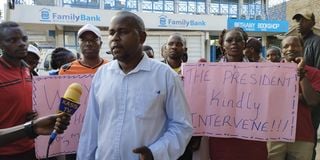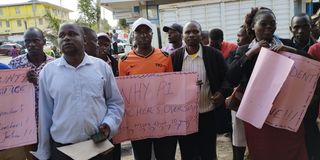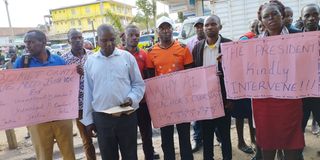Premium
Frustrated teachers ask Ruto to intervene and get them TSC jobs

Teachers protest in Bomet Town on August 23, 2023, saying the Teachers Service Commission (TSC) has failed to employ them in the past 10 years.
For 10 years, Richard Kibet Bwoge, a trained teacher, has applied for employment opportunities advertised by the Teachers Service Commission (TSC), but lady luck has not smiled on him.
Some of his peers who are the trained teachers have remained unemployed for more than 15 years, with hopes of their getting a permanent and pensionable job diminishing yearly.
Frustrated by the turn of events in the recent recruitment exercise, where they were left out, the teachers have now appealed to President William Ruto to intervene and have teachers who graduated earlier to be given first priority and employed enmasse by TSC.
Mr Bwoge is worried that at 36 years, his chances of being employed are dwindling by the day, with 45 years being the cut off age for those eligible to be employed on a permanent and pensionable basis.
Those beyond 45 years can only be employed on contract basis by the government and paid gratuity at the end of term.
“From 2014, I have kept applying for positions whenever they are advertised by TSC, but I have not been successful while others who graduated long after us have been employed,” Mr Bwoge said.

Teachers protest in Bomet Town on August 23, 2023, saying the Teachers Service Commission (TSC) has failed to employ them in the past 10 years.
Mr Bwoge, a P1 trained teacher (Option B) – Social studies, CRE, Music and Arts, English, Kiswahili – graduated in 2013.
Last year, he was among those who up-skilled their training in readiness for employment to render services to learners in Junior Secondary School (JSS) in the country.
“While we have been trained on the 14 learning areas under JSS, we also have skills on Information Communication Technology (ICT) training,” Mr Bwoge said.
“The ICT training, which those of the P1 graduates have, is an added advantage that most of those teaching in high school do not have despite their being degree holders.”
Like his colleagues, he upgraded his training last year at Narok Teachers Training College for a year in the hope they will be employed and deployed to teach at JSS, but they were not considered for the employment opportunities.
Mr Bwoge, who is a Board of Management (Bom) teacher at Tenwek Boarding Primary in Bomet, was trained on sciences, agriculture, home science and mathematics in the upgrade programme.
Mr Peter Kaluma, who trained at Machakos TTC and graduated in 2012, has not been employed by the government, leading him to instead venture into selling second-hand clothes in Kisii Town to provide for his family.
“I have been selling second-hand clothes for the last seven years while applying for opportunities for employment at TSC,” he said.
The P1 trained teacher is among thousands in the country who have not been employed by TSC despite applying for open opportunities over the years.
Ms Janeth Chebet, who graduated at Nakuru Teachers Training College (TTC) in 2009, also upgraded her skills last year at Kericho TTC but is yet to be employed.
“Even in the recent internship, we were not taken on board despite having qualified and scored highly as per the score sheet that was provided by TSC,” she said.

Teachers protest in Bomet Town on August 23, 2023, saying the Teachers Service Commission (TSC) has failed to employ them in the past 10 years.
The unemployed teachers said the government should order that those who were trained earlier be employed unconditionally in a case of ‘first out of college, first to be employed’.
“We have suffered a lot over the years and we are losing hope by the day. Some of us have children who are trained teachers, and are applying for the positions with us with chances they may be employed earlier,” Ms Beatrice Njeri, a trained teacher from Kiambu County, said.
“We have made repeated appeals on this matter to past governments, and our hopes lie with Dr Ruto’s regime.”
A total of 35,000 teachers were employed this year by TSC under President William Ruto’s Kenya Kwanza administration and 35,000 others are set to be employed by the commission in the current financial year.
The Commission was allocated Sh322 billion in the current financial year for employment of teachers to bridge teacher shortages in schools in line with the 100 percent transition of learners in school.
Mr Malel Langat, the Kenya National Union of Teachers (KNUT) National Executive Council (NEC) member, said there was a need to increase the number of teachers being employed annually.
“The government has started on a good footing with employment of 35,000 teachers with the others to be taken on board. But we are appealing to President Ruto to raise the numbers to at least 45,000 annually,” he said.
Mr Ronald Tonui and Mr Henry Obwocha, the Kenya Union of Post Primary Education Teachers (KUPPET) national deputy treasurer and the secretary in charge of secondary schools respectively, said there was an acute shortage of teachers in public schools that needed urgent attention by the government.
“We are hopeful that the government will provide enough resources in the days ahead to enable TSC to employ most of the trained teachers,” Mr Tonui said.
Mr Obwocha stated that the secondary, junior secondary and primary schools across the country were manned mainly by teachers employed by boards of management as opposed to TSC.
“The teachers employed by boards are trained and qualified, yet they have not been employed over the years by TSC. It is a matter that needs to be sorted [out],” he added.
Some of the teachers who have not been employed have resorted to other economic activities such as operating boda bodas and shops, or farming, to fend for their families.





